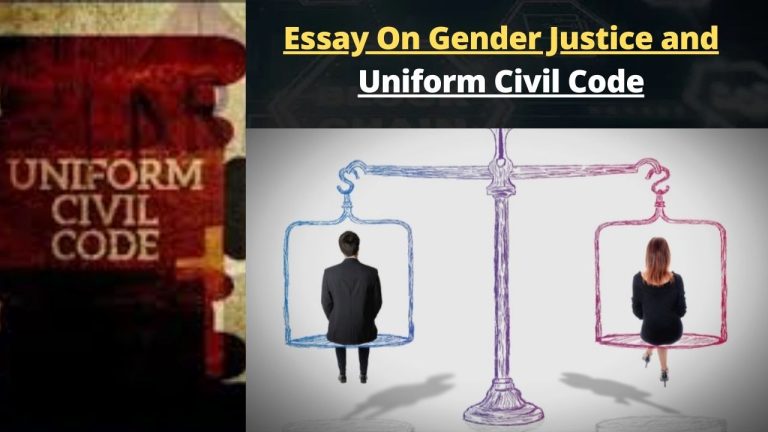"Advertisement"
Essay On Gender Justice and Uniform Civil Code
Hello My Dear Friend, In this post “Essay On Gender Justice and Uniform Civil Code” We will be going to read about the Gender Justice and Uniform Civil Code as an Essay in detail. So…
Let’s Start…
Essay On Gender Justice and Uniform Civil Code
There has been considerable discussion and debate about gender fairness and the idea of a Uniform Civil Code (UCC) in countries all over the world.
In order to guarantee equality, non-discrimination, and peaceful cohabitation within a diverse and pluralistic society, these two interrelated themes are of utmost importance.
In contrast to a uniform civil code, which aims to provide a standard set of civil laws for all citizens, regardless of their religion or cultural background, gender justice comprises assuring equal treatment and opportunities for both genders.
This essay examines the relationship between gender justice and the Uniform Civil Code, highlighting their value and difficulties in the modern world.
Gender Justice: A Necessity for Societal Progress
Gender justice is an essential pillar of a just and inclusive society. It embraces the idea that everyone should have access to the same rights, opportunities, and resources regardless of how they identify as gender.
Eliminating discriminatory practices that support gender-based inequities, challenging stereotypes, and overturning patriarchal norms are all necessary for achieving gender justice.
Assuring equal rights in matters of marriage, divorce, inheritance, and property ownership is one of the most important parts of gender justice.
Women are frequently treated differently in these areas in many civilizations due to religious or personal laws.
By offering a set of laws that are universally applicable and ensure equal rights for all people, regardless of their religious affiliations, the Uniform Civil Code seeks to address this issue.
Uniform Civil Code: Fostering Equality and Integration
A Uniform Civil Code seeks to harmonize personal laws based on various religions and cultural traditions into a single legal framework.
Its primary objective is to promote unity, equality, and secularism while eliminating discriminatory practices that may be present in certain religious laws.
By implementing a UCC, a nation can move closer to achieving true gender justice by ensuring that no individual is subjected to discriminatory laws based on their gender.
Implementing a UCC can also strengthen social integration and cohesion. It reduces divisions within society by promoting a shared legal framework that transcends religious differences.
This common legal code can facilitate a sense of belonging and shared identity among citizens, fostering a more inclusive and unified nation.
Challenges in Achieving Gender Justice through a UCC
Although the idea of a uniform civil code has a lot of potential, its implementation is not without difficulties. The opposition from religious groups, who see it as a danger to their cultural and religious customs, is one of the biggest obstacles. They contend that personal laws are an essential component of their culture and history. Maintaining cultural and religious diversity while balancing the need for gender justice is a difficult task.
A problem is also presented by the diversity of societies themselves. It takes considerable consideration and a nuanced approach to create a common civil code that respects the beliefs and customs of many cultures while maintaining gender fairness. To achieve this balance, it is necessary to have extensive talks and discussions with the participation of feminists, legal professionals, and other stakeholders.
Gender Justice, UCC, and Global Perspectives
An international desire for equality and social advancement is shared by the pursuit of gender justice and the creation of a Uniform Civil Code. To guarantee gender equality, many nations have changed their family laws, frequently by amending the rules governing inheritance, marriage, and divorce. For instance, a number of Middle Eastern nations have changed their laws to give women more rights when it comes to marriage and divorce.
Similar to this, nations with diverse and pluralistic societies like India are attempting to balance gender equity and cultural sensitivity through law reforms. Nations can gain ideas on how to navigate the route toward gender equality while respecting cultural variety by learning from global experiences.
Conclusion
Together, gender justice and the Uniform Civil Code have the power to create cultures that value social peace, equality, and justice. In order to achieve gender justice, discriminating behaviors must be eliminated, and both genders must have equal rights. On the other side, a Uniform Civil Code aims to create a universal legal system that transcends religious differences and promotes equality.
However, there are several obstacles in the way of enacting a uniform civil code, including opposition from religious organizations and the have to take into account various cultural customs. However, the international push for legal change and gender equality gives nations that want to build a fair and just society hope and motivation.
Open communication, teamwork, and a thorough comprehension of cultural nuances are crucial in the path toward gender equity and the adoption of a Uniform Civil Code. Societies can aim to build a future in which everyone can live with respect and equality, regardless of gender or religious origin, by making these concerted efforts.
Finally, Thanks For Reading “Essay On Gender Justice and Uniform Civil Code“.
If you have any questions related to “Essay On Gender Justice and Uniform Civil Code“, So, please comment below.
Must Read:
